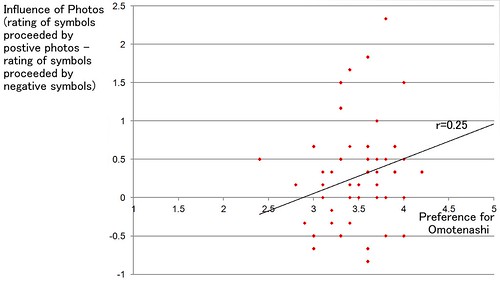Wednesday, December 04, 2019
Omotenashi and Weak-Mindedness

There is a tendency for Japanese hospitality providers to provide the type and frequency of hospitality that they consider appropriate to their customers without asking their customers, or waiting to be ordered by them. Ideally Japanese hospitality providers should read the non-verbal signals of their customers and provide the services to make their customers happy prior to having to be asked (Doi, 1973).
In a typically modest and collectivism-believing fashion, Ikeda (2020, in preparation), a seminar student hypothesised that this type of hospitality is popular in Japan since the Japanese are easily lead, or weak-minded. In order to test this hypothesis we showed students a series of positive and negative pictures (Dan-Glauser & Scherer, 2011) followed by abstract symbol asking them to rate the positivity of latter, measuring the extent they were influenced by the photographs (which they were told to ignore) and asked them the extent to which they enjoyed Japanese style hospitality (omotenashi).
In line with the graduate student's hypothesis, a weak positive correlation (r=0.25) was found between our test of weak-mindedness and the preference for omotenashi as shown in the graph above.The horizontal axis shows preference for omotenashi, whereas the vertical axis shows the extent to which abstracted symbols were rated as having the same valence as the photographs which proceeded them.
[I think that this is a very negative way of seeing Japanese hospitality which is rather motivated by trust in hosts, a desire to allow others (hosts) to be individuals and to express their individualism, a lack of desire to hear themselves think or speak, a preference for and belief in the efficacy of non verbal communication, and enjoyment of and tolerance to surprise and the unusual, and a lack of a hatred of the influence of others. I may attempt to test these other hypotheses in future research.]
Dan-Glauser, E. S., & Scherer, K. R. (2011). The Geneva affective picture database (GAPED): a new 730-picture database focusing on valence and normative significance. Behavior research methods, 43(2), 468.
Doi, T. (1973). The anatomy of dependence. Tokyo: Kodansha. Goldberg,
Ikeda, Y. 池田良生.(2020)「おもてなしとマインド・コントロール」山口大学経済学部卒業論文(準備中)
This blog represents the opinions of the author, Timothy Takemoto, and not the opinions of his employer.
